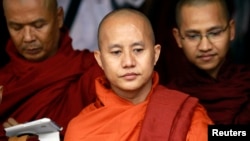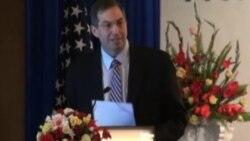RANGOON —
This week's Time Magazine cover bearing the image of Wirathu, a monk who has come under international scrutiny for spreading anti-Muslim hate speech was banned in Burma. Has hate-speech on the internet and in sermons delivered by Buddhist monks led to religious violence, and has the government fulfilled its responsibility in dealing with hate speech?
Burma has only just recently stopped censoring print news media, but when Time magazine ran a cover story detailing the anti-Muslim hate-speeches of influential Buddhist monk Wirathu, the issue was banned because the information ministry feared it could incite further violence.
Since June of last year, five separate incidents of communal violence perpetrated against Muslims across the country have left scores dead, and over 150,000 displaced.
Watch related video of the U.S. Embassy in Burma hosting a workshop:
At a workshop on preventing hate speech in Burma on Friday U.S. ambassador Derek Mitchell delivered opening remarks in which he stated that the government's ability to deal with hate speech will determine the country's future, and cautioned against the potential for uncontrolled hate speech to incite violence.
"This country has been at war with itself. For decades the talk has been one of enemies within," he said. "This attitude has been a major cause of this country's underdevelopment. As a close observer who cares deeply about the future of your country, it is very sad to see that talk continue and take new forms."
Wirathu's rhetoric includes calls for Muslim blood at public sermons where audiences number several thousand.
Deputy Minister of Information Ye Htut believes it was necessary to ban the magazine, and blamed social media like Facebook for spreading hate speech. He blamed Burma's tight media controls in the past for contributing to people's inability to effectively deal with newfound freedoms, and said he doesn't believe Wirathu's speeches qualify as hate speech.
"We have to differentiate between what is a strong opinion and what is a hate speech," said Ye. "We have to allow the freedom of speech and also we have to make clear guidelines on what is hate speech. That's why one of the monk reminded U Wirathu to control his emotion."
Wirathu was jailed in 2003 for inciting violence, and released in 2011. He has continued to make speeches without interference from the government.
Many citizens feel dissatisfied with the government's response to controlling anti-Muslim sentiment, among other reasons because Burmese courts that have convicted Muslims after incidents of communal violence have yet to convict a single Buddhist with incitement.
Thet Ko Ko, a Muslim from Moulmein, home to the monastery from which the anti-Muslim "969" movement originated, traveled to Rangoon to attend the workshop, and says he's very disappointed in what was said at the workshop.
"My religion faces discrimination from the state and the majority especially some Buddhist monks. I'm not satisfied," said Ko Ko. "We need government to prevent hate speech in Myanmar [Burma], especially by law. I mean public speeches, there are a lot of information in many villages they distribute. Why they didn't prevent this activities is the main point. Very weak [in not preventing this] prevent in this."
Next week, the Ministry of Religious Affairs is expected to make an announcement about the controversial drafting of a new law that would prevent interfaith marriage between Buddhist women and Muslim men.
Burma has only just recently stopped censoring print news media, but when Time magazine ran a cover story detailing the anti-Muslim hate-speeches of influential Buddhist monk Wirathu, the issue was banned because the information ministry feared it could incite further violence.
Since June of last year, five separate incidents of communal violence perpetrated against Muslims across the country have left scores dead, and over 150,000 displaced.
Watch related video of the U.S. Embassy in Burma hosting a workshop:
At a workshop on preventing hate speech in Burma on Friday U.S. ambassador Derek Mitchell delivered opening remarks in which he stated that the government's ability to deal with hate speech will determine the country's future, and cautioned against the potential for uncontrolled hate speech to incite violence.
"This country has been at war with itself. For decades the talk has been one of enemies within," he said. "This attitude has been a major cause of this country's underdevelopment. As a close observer who cares deeply about the future of your country, it is very sad to see that talk continue and take new forms."
Wirathu's rhetoric includes calls for Muslim blood at public sermons where audiences number several thousand.
Deputy Minister of Information Ye Htut believes it was necessary to ban the magazine, and blamed social media like Facebook for spreading hate speech. He blamed Burma's tight media controls in the past for contributing to people's inability to effectively deal with newfound freedoms, and said he doesn't believe Wirathu's speeches qualify as hate speech.
"We have to differentiate between what is a strong opinion and what is a hate speech," said Ye. "We have to allow the freedom of speech and also we have to make clear guidelines on what is hate speech. That's why one of the monk reminded U Wirathu to control his emotion."
Wirathu was jailed in 2003 for inciting violence, and released in 2011. He has continued to make speeches without interference from the government.
Many citizens feel dissatisfied with the government's response to controlling anti-Muslim sentiment, among other reasons because Burmese courts that have convicted Muslims after incidents of communal violence have yet to convict a single Buddhist with incitement.
Thet Ko Ko, a Muslim from Moulmein, home to the monastery from which the anti-Muslim "969" movement originated, traveled to Rangoon to attend the workshop, and says he's very disappointed in what was said at the workshop.
"My religion faces discrimination from the state and the majority especially some Buddhist monks. I'm not satisfied," said Ko Ko. "We need government to prevent hate speech in Myanmar [Burma], especially by law. I mean public speeches, there are a lot of information in many villages they distribute. Why they didn't prevent this activities is the main point. Very weak [in not preventing this] prevent in this."
Next week, the Ministry of Religious Affairs is expected to make an announcement about the controversial drafting of a new law that would prevent interfaith marriage between Buddhist women and Muslim men.










